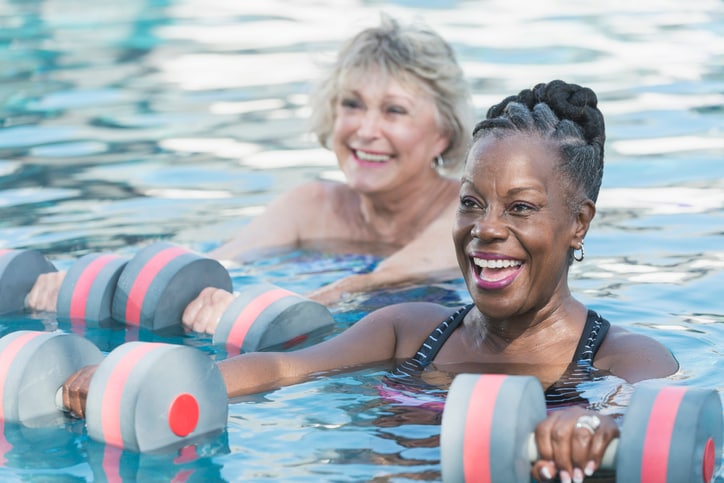Has an older adult in your care seemed more unsteady on their feet lately? Perhaps they’re moving more slowly, or you’ve noticed they frequently feel dizzy or lightheaded. You may find yourself wondering if you should be concerned about these issues, and you’re right to pay attention.
A 2015 study published in the journal Aging and Disease found 24% of American seniors over age 72 have bouts of dizziness or imbalance. Balance problems are particularly worrisome for seniors because they put them at an increased risk of falls. “One of the number one causes of injuries among seniors is losing their balance and falling,” says Emily Stef, a certified health care aide who works in a long-term care facility in Alberta, Canada. “At my facility, I’d say well over half of the residents have had issues with their balance and struggle with it daily.”
Balance issues affect many older adults, but that doesn’t mean seniors just have to learn to live with the problem. Here, medical experts share some common causes of balance issues, what seniors can do to improve their balance and mobility long term and when it’s time to see a doctor.
What causes balance issues in older adults?
“Balance and coordination issues are common in seniors due to changes that occur in normal aging,” says Dr. Nakeisha Rodgers, a board-certified geriatrician with Tallahassee Memorial Healthcare in Florida.
While many different factors contribute to dizziness and balance issues in seniors, these issues most frequently occur due to one of the following:
- Certain medications.
- Inner ear disturbances, such as fluid retention or sinus problems.
- Dehydration.
- Loss of muscle mass or strength.
- Natural declines in reaction time or motor control.
- Conditions that affect the circulatory system or nervous system.
Some dizziness or balance problems may be caused by low blood pressure. “The body normally maintains blood flow by increasing heart rate and constricting the blood vessels when a person changes position,” Rodgers says. “These reflexes can diminish with aging.”
Certain medications can also exacerbate dizziness and balance problems, particularly if they affect the nervous system, circulatory system or kidneys, says Dr. Alfred Fisher, Chief of the Division of Geriatrics, Gerontology and Palliative Care Medicine at the University of Nebraska Medical Center in Omaha, Nebraska.
Seniors may also struggle with balance problems due to declines in their physical health. “As the body ages, the muscles atrophy. Complete bed rest for 10 days can set a person back four months,” Rodgers says.
Top exercise recommendations for older patients with balance issues: Tai Chi or yoga.
— DR. NAKEISHKA RODGERS, GERIATRICIAN WITH TALLAHASSEE MEMORIAL HEALTHCARE
Tips for improving balance and mobility
Luckily, there are steps older adults can take to address issues with dizziness and imbalance and improve their overall mobility. Here’s what the experts recommend.
Stay hydrated
“Our thirst mechanism declines with age, so seniors need to intentionally drink more fluids, if they are not on a fluid restriction,” says Dr. Tom Cornwell, the senior medical director of Village Medical at Home. In addition to a declining sense of thirst, some medications also act as diuretics, meaning they increase urination. It’s important to chat with a doctor about how much fluid is ideal.
Exercise regularly
“Particularly important is exercise that helps to build muscle, increases flexibility and enhances coordination,” Fisher says. “We often think about walking, which is great for endurance, but is less helpful in these areas.”
Rodgers says her top exercise recommendations for older patients with balance issues are Tai Chi or yoga. “They are great for teaching muscle memory,” she explains. Parks and senior centers can be a good place to get involved in these kinds of activities for a reasonable price.
Create a safe environment
If an older loved one or patient exhibits signs of dizziness or balance problems, take precautions to keep them safe and make it easier to get around until a cause is discovered. “When they’re standing, it’s important to keep a chair behind them until they are ready to move, as well as asking them if they are feeling well enough to stand,” Stef says.
She also suggests checking to be sure their living space is clear of tripping hazards, and that they are wearing proper footwear when they’re out and about.
Ask about compression socks
Rodgers says compression stockings or socks can help prevent pooling of the blood in the extremities, which may help prevent dizziness in some patients. It’s a good idea to consult a doctor for guidance on which products may work best and when to use them before trying this option.
Consider physical therapy
Depending on the nature of a senior’s balance issues, some doctors may refer the patient to a physical therapist. “Physical therapists do an amazing job of teaching patients how to rise slowly,” Rodgers says. “And they can encourage them to participate in limb strengthening exercises.”
Ask about adjustments to medications
Cornwell says numerous medications can cause dizziness and falls, including:
- Antipsychotics.
- Benzodiazepines, like Valium or similar prescriptions.
- Sleeping pills.
- Blood pressure pills.
- Diabetic medications.
If an older adult is taking one of these medications and experiencing dizziness or imbalance, it’s important to talk to their doctor about their symptoms.
Learn about assistive mobility devices
Some older adults may need a device, such as a cane or walker, to assist them in walking and prevent falls. Rodgers says the most common of these are the one-point cane, four-point cane and rolling walker, and a doctor can tell you which will be most helpful.
What do balance issues look like?
While dizziness or imbalance are not always signs of a more serious problem, ongoing balance problems can sometimes be due to underlying medical issues. “Examples of more serious illnesses include diabetes and heart disease, along with other rare but serious disorders,” Cornwell.
For this reason, it’s important that dizziness and balance problems aren’t ignored. Signs that someone is having an episode of dizziness or imbalance include:
- Swaying.
- Confusion.
- Rapid breathing.
- Blurred vision.
- Lightheadedness.
- Leaning.
- Nausea.
- Increased clumsiness.
- Quickened or uneven steps.
“It is easy to get trapped in a vicious cycle where these problems lead people to become more sedentary, which then can lead to worsened problems, particularly with balance.”
— DR. ALFRED FISHER, CHIEF OF THE DIVISION OF GERIATRICS, GERONTOLOGY AND PALLIATIVE CARE MEDICINE AT THE UNIVERSITY OF NEBRASKA MEDICAL CENTER
When to see a doctor
“Because dizziness can cause falls with devastating consequences and can be a sign of an underlying problem, patients should see a doctor for any recurring dizziness,” Cornwell says.
Rodgers says it’s important to consult a physician immediately if you notice:
- Symptoms that come on suddenly or rapidly increase.
- Dizziness or imbalance that persists for longer than 48 hours.
- The person’s ability to walk or function independently is impeded.
- Dizziness or imbalance that is associated with a headache.
- Dizziness or imbalance that leads to loss of consciousness.
Most importantly, seniors should never assume balance issues are just something they have to put up with or allow their difficulties with balance to impede an active, healthy lifestyle.
“It is easy to get trapped in a vicious cycle where these problems lead people to cut back on activities and become more sedentary, which then can lead to worsened problems, particularly with balance,” Fisher says. “Getting help can prevent this cycle from starting or break the cycle early on when it is easier. Getting help also reduces the risk of falls, which can lead to serious injuries.”





